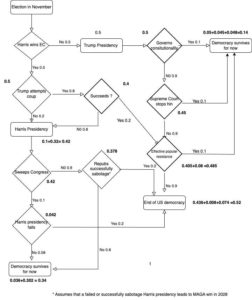What can Americans do? What should Australia do?
A few weeks ago, I drew up a flowchart to estimate the probability that Trump would establish a dictatorship in the US, which looked, at the time, like an even money bet.
We don’t need to speculate any more. Trump has announced the dictatorship, and there is no sign of effective resistance. The key elements so far include
Extremists announced for all major positions, with a demand that they be recess appointments, not subject to Senate scrutiny
A state of emergency from Day 1, with the use of the military against domestic opponents
Mass deportations, initially of non-citizens and then of “denaturalised” legal immigrants
A third term (bizarrely, the nervous laughter that greeted this led to it being reported as a
Read More »







